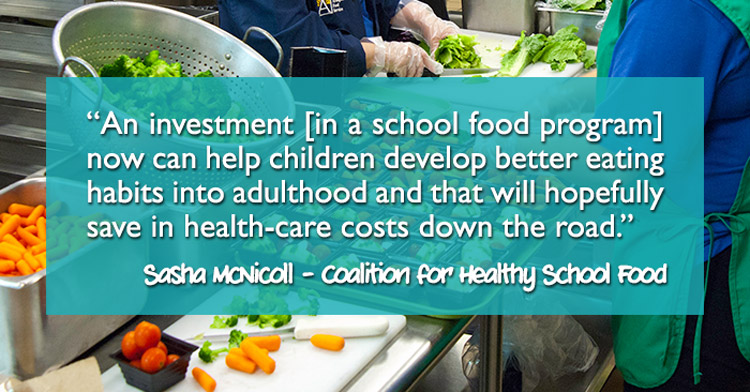Action Needed from Federal Government on Student Nutrition, says The Coalition for Healthy School Food

![]()
Context: The federal government's new approaches to healthy eating will include new eating guidelines, as well as new rules for marketing and labelling certain foods aimed at children. Speaking at a Montreal Health Congress last week, Health Minister Jane Philpott said the "iconic" Canada's Food Guide has not kept up with the country's changing demographics and lifestyles. Following this announcement, the Coalition for Healthy School Food is calling for the federal government to work with provinces to feed schoolchildren. Canada is one of the only industrialized countries without a national school food program to ensure all children are fed healthy food in schools every day.
Article published by Susan Lunn, Kathleen Harris, CBC News
Sasha McNicoll, co-ordinator of the Coalition for Healthy School Food, urged the federal government to fund a school food program in every school in the country as a way to ensure kids are eating nutritious food. She said the program would cost about $1 billion a year, and suggested the federal government kick in 20 per cent of the costs shared by the provinces, municipalities and civil society groups. "It can improve their health and it can improve their education outcomes," she told CBC News. "An investment now can help children develop better eating habits into adulthood and that will hopefully save in health-care costs down the road."
[...]
Read the full CBC News article here.
The Coalition for Healthy School Food commends the announcements of a renewed Canada’s Food Guide, restriction of marketing of unhealthy foods and beverages to children, and of efforts to curb the consumption of sodium, sugar, and saturated and trans fats. Nonetheless, the Coalition believes that access to healthy food in schools must be increased in order to create a healthier next generation of Canadians.
Canada’s children and youth face serious food-related challenges: only one-third of children between the ages of 4 and 13 years eat five or more servings of vegetables and fruit daily; one-third of students in elementary schools and two-thirds of students in secondary schools do not eat a nutritious breakfast before school, leaving them at risk for learning, behavioural, and health challenges at school; and one-quarter of children's calorie intakes are from food products not recommended in Canada's Food Guide.
School food programs, which currently receive piecemeal funding from provinces and municipalities, have shown to increase consumption of fruits and vegetables, improve physical and mental health, decrease behavioural and emotional problems, improve educational outcomes, and increase graduation rates. Given all the positive impacts, it is difficult to understand why Canada remains one of the only industrialized countries not to fund a school food program.
“Minister Philpott’s announcement of new measures to address healthy eating is encouraging,” says Sasha McNicoll, Coordinator of the Coalition for Healthy School Food at Food Secure Canada. “Health Canada should be looking at creating a national healthy school food program to improve child health.”
_
Food Secure Canada convenes the Coalition for Healthy School Food, which comprises over 30 regional, provincial and national organizations, representing hundreds of thousands of Canadians, working toward a national school food program for Canada.
- Log in to post comments

